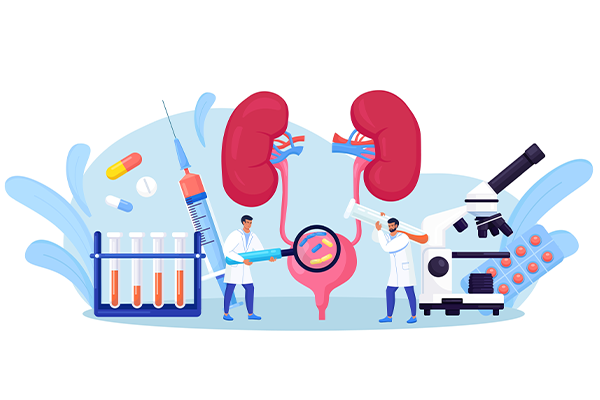
Let’s be honest—no one wants to talk about bladder stones. But if you’ve ever felt a sharp twinge down low, dreaded a trip to the loo, or wondered why your urine looks odd, you’ll know these little troublemakers can turn life upside down. Choosing to ignore the warning signs is not only uncomfortable but also dangerous. So, let's give voice to the silence and discuss exactly what bladder stones feel like, why they appear, and what one can do about them.
If you’re experiencing any of these symptoms or simply want peace of mind, it’s important to seek help from professionals who understand the complexities of bladder health. That’s where we come in. If you’re looking for expert guidance, consult our top Urologist in Gurugram for a comprehensive evaluation and treatment for bladder stones:
Synopsis
When Your Bladder Starts Shouting: Symptoms That Matter
Here’s what bladder stones might throw your way:
-
A stubborn ache or sharp pain in your lower belly
-
Burning or stinging when you pee
-
Feeling like you need to go all the time, especially at night
-
Blood in your urine, or urine that’s suddenly cloudy or dark
-
That annoying stop-start flow, or feeling like you just can’t empty your bladder completely
-
For men, pain that radiates to the tip of the penis
If you’re ticking off any of these stone in bladder symptoms, don’t just grit your teeth and hope for the best. Bladder stones without treatment can lead to nasty infections, bladder damage, and even kidney trouble.
Our urologists in Gurugram are here to help you get the right diagnosis and the care you need before complications arise.
Why Do Bladder Stones Even Happen?
You might wonder, “Why me?” The truth is, stones, causes, and treatments are often linked to not emptying your bladder fully. This can be down to an enlarged prostate, nerve issues, infections, or even past surgery. When urine hangs around, minerals start to clump together, and voilà—a stone forms.

Other Risk Factors
-
Not drinking enough water
-
A diet high in salt or animal protein
-
Had bladder problems before
-
Sometimes, a stone from the kidney may migrate down into the bladder and grow there
The good news is, once our doctors figure out the cause, we can help you nip it in the bud. Our experts at Gurugram specialise in identifying the root cause and tailoring treatment to your unique needs.
How Do Doctors Figure It Out? Getting a Clear Diagnosis
If you’re concerned about bladder stones, our urologists will begin with a detailed discussion and a physical examination. We might ask for:
-
A urine sample (to spot blood, infection, or crystals)
-
An ultrasound, X-ray, or CT scan (to see the stones)
-
A cystoscopy—a tiny camera that takes a peek inside your bladder
This thorough approach helps us decide the best next step for you. For advanced diagnostic tools and experienced specialists, our urologists in Gurugram are a trusted choice.
So, How Are Bladder Stones Treated?
Small stones sometimes pass on their own if you drink loads of water, but let’s be honest—most need a helping hand. The main treatment is called cystolitholapaxy. It sounds fancy, but it’s just a thin tube with a camera that breaks up the stone with a laser so that the small fragments can be flushed out.
Suppose you’re in Gurugram and want a urology centre with a track record of successful outcomes. In that case, our urology facility provides both minimally invasive and surgical options, ensuring you get the best care from diagnosis to recovery.
What If You Just Ignore Them?
Letting bladder stones fester without treatment is a recipe for trouble. They can tear up the bladder lining, cause infections, or even block the flow of urine (urinary obstruction), putting your kidneys at risk. If you’re hoping they’ll just disappear, it’s time for a rethink.
Explore More of Our Blogs: Urethroplasty: Procedure, Risks, Results And Recovery
Can Bladder Stones Be Stopped?
Yes, you’re probably wondering, can bladder stones be stopped from coming back?
Absolutely. Here’s how to prevent bladder stones from making a repeat appearance:
-
Drink plenty of water—seriously, it’s the simplest fix
-
Don’t hold in your pee; empty your bladder when you need to
-
If you’ve got prostate or bladder issues, keep up with regular check-ups
-
Treat urinary infections promptly
-
Watch your diet—less salt, more veggies, less processed foods
If you’ve had stones before, your doctor might suggest “double voiding”—going to the loo, waiting a minute, and trying again to make sure your bladder’s empty.
For ongoing support and preventive strategies, our urology specialists in Gurugram can guide you with personalised advice and regular follow-up.
Don’t Suffer in Silence
Bladder problems can feel embarrassing, but you’re not alone, and you don’t have to put up with the pain. With today’s treatments and a good urology team behind you, you can get back to normal life without worrying about every trip to the toilet. If you’re in doubt, get checked. Your future self will thank you.
Reach out to our Urology doctors in Gurugram for expert, confidential, and compassionate care. Contact our specialists at the Department of Urology and book an appointment now.
FAQ's
Lower belly pain, burning when you pee, blood in your urine, and a stop-start flow. These are all classic signs of bladder stones.
Neglecting treatment can lead to infections, damage or injury to the urinary bladder, and kidney-related complications. Always choose early treatment for bladder stones.
Yes, stay hydrated, address any underlying conditions, and maintain healthy habits when it comes to diet and bladder care.
Primarily, this is determined by the bladder stones-upon-urine test, ultrasound or scan, and occasionally cystoscopy, as the procedure of examining the bladder's interior.
Increased intake of water, complete emptying of the bladder, treating infections promptly, and regular monitoring in case of risk factors.





















 5 Min Read
5 Min Read


















